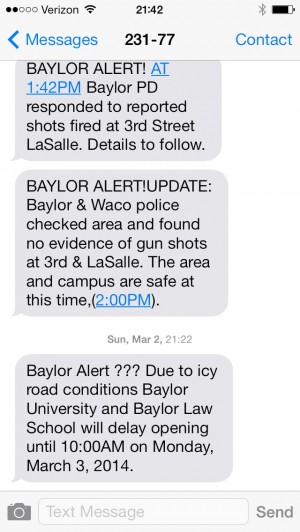
By Rae Jefferson
Staff Writer
Maintaining open lines of communication between the university and students is crucial during a campus emergency. This is why the Baylor Police Department notified students of improvements to the university’s emergency alert system Tuesday.
The system, called Baylor Alert, informs students, faculty and staff of emergencies such as gunfire, assaults and natural disasters on and around campus. Services of the system include audio or text message phone alerts, email notifications to Baylor email accounts, and outdoor and indoor loudspeaker notifications.
“We wanted to emphasize some things and clarify the alerts we send,” Baylor Police Chief Jim Doak said.
The most recent revisions to the system, which were discussed in the email, were focused on the cellular features of Baylor Alert.
Students who have provided a phone number under BearWeb’s personal information tab receive emergency alerts via text in addition to the Baylor email notifications. The police department has worked to clarify these notifications, Doak said.
“We’re making the alerts more target specific,” he said. “We’re cutting down on how many alerts are sent out and we’re making sure they are accurate.”
St. Louis sophomore Shannon Sanders said she appreciates the effort the police department is taking to update the system.
“It shows that they have concern for the issue,” she said.
Houston sophomore Christa Morris, who subscribes to the text alerts, said she commends the revisions being made to the system.
“I think it’s a really good thing,” she said. “It’s great that they’re working to make the system more efficient.”
In the past, the alert system has falsely notified the Baylor community of emergencies, although the system clarified the false alarms with follow-up texts and emails. Doak said these erroneous notifications often involved loud noises being mistaken for gunshots.
“We have people popping fireworks all the time,” he said. “Even door slams, if heard the right way, can sound like gunfire.”
Morris said she remembers a recent alert when reported gunfire was later found to be noises made by a dumpster.
“In the past, it’s gotten people in a panic over nothing,” she said, referring to the system’s false alarms.
The email sent to students assured them that the department is working to be more certain of the accuracy of notifications.
“These alerts are now being sent to you out of an abundance of caution, and we assure you that officials always analyze the situation and verify the need for communication before sending an alert,” the police department said.
Morris said she believes false notifications are more dangerous than some may think.
“People could get the idea that it’s always a false alarm — like the boy who cried wolf,” she said. “You want people to take your messages seriously, especially when they’re dealing with emergency situations.”
Sanders said she agrees that the credibility of the alert system suffers when false alarms are received.
“After getting enough of those texts, people stop thinking it’s a real emergency,” Sanders said. “They don’t take as much caution as they would if they actually believed what was going on. Some people’s parents also get those alerts, and that can be scary for them, especially if they live out of state and aren’t close to their child.”
Doak said the system’s revisions were partially geared toward putting the Baylor students at ease.
“We don’t want to needlessly put fear into the minds of Baylor students,” he said.
Doak said the revisions to the alert system have been successful so far.
“We’ve done a better job of recognizing what’s what,” Doak said. “We’d prefer to not have to use the system at all, but if we do, we know that it’s effective.”
Students, faculty and staff can sign up for this emergency alert system by going to baylor.edu/emergency.